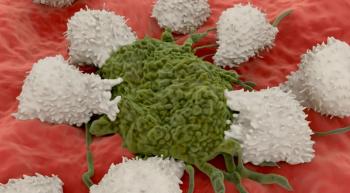
The FDA has granted priority review to the new drug application for the HIF-2α inhibitor belzutifan for the potential treatment of patients with von Hippel-Lindau–associated renal cell carcinoma that does not require immediate surgery.

Kristi Rosa joined MJH Life Sciences in 2016 and has since held several positions within the company. Prior to working at the company, she served as lead copywriter and marketing coordinator at The Strand Theater. Email: krosa@onclive.com

The FDA has granted priority review to the new drug application for the HIF-2α inhibitor belzutifan for the potential treatment of patients with von Hippel-Lindau–associated renal cell carcinoma that does not require immediate surgery.

The FDA has granted a fast track designation to poziotinib for use in previously treated patients with HER2 exon 20 mutations.

One in 7 Caribbean-born individuals with either breast or ovarian cancer had hereditary disease with an actionable pathogenic variant, which provides the opportunity for the utilization of targeted therapeutics and precise prevention strategies.

The FDA has approved the VENTANA ALK CDx assay as a companion diagnostic to identify patients with ALK-positive non–small cell lung cancer who are eligible to receive treatment with lorlatinib.

One year into the COVID-19 pandemic has allowed for some reflection on the different evolutions that the oncology community went through in response to the many challenges posed by the virus

Poziotinib, when given at a daily dose of 16 mg, was found to demonstrate clinically meaningful activity when used in treatment-naïve patients with metastatic non–small cell lung cancer who harbor EGFR exon 20 mutations.

The treatment paradigm for chronic lymphocytic leukemia has expanded beyond continuous treatment with BTK inhibitors with the addition of the time-limited regimen of venetoclax plus obinutuzumab.

The FDA expanded the indication for lorlatinib to include the front-line treatment of patients with ALK-positive non–small cell lung cancer.

The FDA has granted a breakthrough therapy designation to tipifarnib for use in patients with recurrent or metastatic HRAS-mutated head and neck squamous cell carcinoma with variant allele frequency of 20% or higher following progressive disease on platinum-based chemotherapy.

The FDA has approved the PD-L1 IHC 22C3 pharmDx assay, developed by Agilent Technologies Inc, for expanded use in patients with non–small cell lung cancer.

The National Comprehensive Cancer Network has issued guidelines for the management of children with a rare type of kidney cancer referred to as Wilms Tumor, or nephroblastoma.

The use of next-generation sequencing demonstrated that 34% of patients with sarcoma had potentially actionable mutations.

The FDA has accepted and granted a priority review designation to the biologics license application for Vicineum for use in patients with high-risk Bacillus Calmette-Guérin–unresponsive non–muscle invasive bladder cancer.

The FDA has granted priority review to sotorasib for the treatment of patients with KRAS G12C–mutated locally advanced or metastatic non–small cell lung cancer, after at least 1 previous systemic therapy.

The FDA has approved trilaciclib to reduce the frequency of chemotherapy-induced bone marrow suppression in adults receiving certain types of chemotherapy for extensive-stage small cell lung cancer.

The FDA approved cemiplimab-rwlc as the first immunotherapy for use in patients with advanced basal cell carcinoma that has previously been treated with a hedgehog pathway inhibitor (HHI) or for whom a HHI is not appropriate.

The FDA has approved lisocabtagene maraleucel for adult patients with certain types of large B-cell lymphoma who have not responded to, or who have relapsed after, at least 2 other types of systemic treatment.

In response to the novel coronavirus disease 2019 (COVID-19) pandemic, investigators around the world channeled their efforts into acquiring a better understanding of the virus so that they could rapidly identify any weapons that may be used in the fight against its spread; this included turning to tried-and-true cancer drugs to see whether they could be repurposed to address this pressing need.

Recent progress made with messenger RNA (mRNA) vaccines has led to amplified protein translation, stronger modulation of immunogenicity, and improved delivery, which has all contributed to an evolution in the application of these products in the field of cancer.

Cancer screening has decreased since the start of the COVID-19 pandemic, but the NCCN, ACS, and other leading organizations say that it should resume.

The FDA has granted the cell-based, off-the-shelf immune primer ilixadencel an orphan drug designation for use as a treatment option in patients with soft tissue sarcoma (STS), according to an announcement from Immunicum AB.

The FDA has granted toripalimab a fast track designation for use in the frontline treatment of patients with mucosal melanoma, according to an announcement from Junshi Biosciences, the drug developer.

The FDA has granted priority review to a biologics license application (BLA) for retifanlimab (INCMGA 0012) for the treatment of adult patients with locally advanced or metastatic squamous cell carcinoma of the anal canal (SCAC) who were intolerant of or who had progressed on platinum-based chemotherapy.

The FDA has granted a priority review to a supplemental biologics license application for nivolumab (Opdivo) in combination with a fluoropyrimidine- and platinum-containing chemotherapy for use in patients with advanced or metastatic gastric cancer, gastroesophageal junction (GEJ) cancer, or esophageal adenocarcinoma.

The FDA has granted a fast track designation to padeliporfin Immune Photo Activated Cancer Therapy (ImPACT) for use in the treatment of patients with low-grade and unifocal upper-tract urothelial cancer (UTUC), according to an announcement from Steba Biotech.

The FDA has approved crizotinib for the treatment of pediatric patients 1 year of age and older and young adults with ALK-positive relapsed or refractory, systemic anaplastic large cell lymphoma.

The addition of eganelisib (IPI-549) to nivolumab (Opdivo) was found to elicit encouraging responses and improve progression-free survival (PFS) compared with single-agent nivolumab in patients with platinum-refractory, immunotherapy-naïve, advanced, metastatic urothelial cancer, according to an update from the phase 2 MARIO-275 (NCT03980041).

The FDA has granted fast track designations to cavrotolimod (AST-008) for use in combination with a PD-1 therapy in patients with locally advanced or metastatic Merkel cell carcinoma (MCC) that is refractory to previous PD-1 blockade and for use in combination with a PD-1/PD-L1 agent in those with advanced or metastatic cutaneous squamous cell carcinoma (CSCC) that is refractory to previous PD-1/PD-L1 blockade.

The FDA has approved a supplemental new drug application to add overall survival (OS) and other secondary end point data from the phase 3 ARAMIS trial (NCT02200614) to the prescribing information for darolutamide (Nubeqa) for the treatment of patients with nonmetastatic prostate cancer (nmCRPC).
